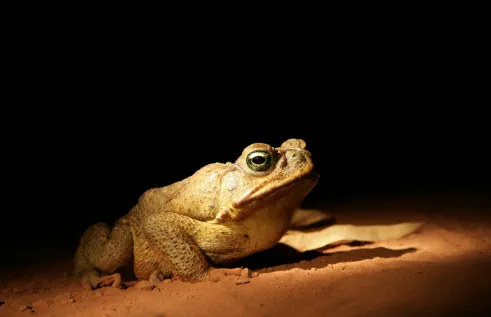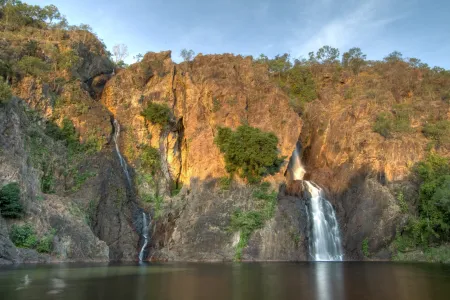News
Major investment urgently needed to protect Litchfield National Park from gamba grass
New research has warned that almost 30% of Litchfield National Park could be infested with the invasive weed gamba grass within a decade.
Infestations in the national park have spread rapidly and already cover about 30,000 hectares of the 144,000-hectare park.
The research, published in the Journal of Environmental Management, called for urgent action and resources to control the weed, which can pose an extreme fire risk to popular visitor areas.
Charles Darwin University (CDU) ecologist and lead author Dr Natalie Rossiter-Rachor said Litchfield is an iconic national park in northern Australia.
“It contains significant environmental, cultural and social values. It’s referred to as the ‘jewel in the crown’ of Top End parks,” Dr Rossiter-Rachor said.
“However, our research shows this is all at risk unless a major investment is made in weed control."
The research, funded by the Australian Government’s National Environmental Science Program and the Northern Territory Government, conducted helicopter surveys of the park in 2014 and again in 2021–22. These surveys showed the invasive weed has spread rapidly since 2014, covering 30,000 hectares of the 144,000-hectare park, including near popular sites such as Florence Falls and Buley Rockhole. It is the largest gamba grass infestation in a national park in Australia.
Tackling gamba grass is identified as a priority in the federal government’s Threatened Species Action Plan. New Australian Government funding of $9.8 million is being directed to strategic gamba grass control in locations where it can be eradicated and contained, such as Kakadu National Park and Arnhem Land.
Given the outcomes of this new research, significant investments are also needed to address catastrophic and established infestations in areas managed by states and territories, such as Litchfield National Park.
Researchers examined three different future management scenarios for gamba grass in the park and modelled the distribution of gamba grass after 10 years of each scenario. Under the do-nothing scenario, gamba grass will continue to rapidly spread in the park, covering more than 42,000 hectares and impacting all popular visitor sites – degrading habitats for threatened species and posing extreme risks for bushfires fuelled by gamba’s large fuel loads.
The second scenario would see gamba grass removed from the Litchfield’s small existing gamba grass eradication zone on Tabletop Range, predicted to cost $825,000 over five years. But under this scenario, sites such as Florence Falls and Tolmer Falls would still become infested and gamba could continue to spread in the rest of the park, covering more than 41,000 hectares of the park over the next decade.
Study co-author Professor Samantha Setterfield from The University of Western Australia said “We propose a new scenario where gamba grass is eradicated over a much larger area of the park to better protect the significant values of the park, predicted to cost $6.6 million over five years. Under this scenario, gamba would be kept away from most major visitor attractions.
This significant investment in intensive gamba grass control and monitoring is needed to protect important habitats and visitor areas in the park.”
Dr Rossiter-Rachor emphasised the need for swift action.
“Gamba is spreading quickly in Litchfield,” Dr Rossiter-Rachor said.
“The longer we wait to fund intensive management action, the more expensive it will become and the more impacts we’ll see to the park’s incredible biodiversity and stunning natural areas.”
This research is published in the Journal of Environmental Management and can be accessed at https://authors.elsevier.com/sd/article/S0301-4797(22)02358-1.
Related Articles

First “hype cycle” of AI development put tech above humans
Users around the world have rushed to adopt artificial intelligence - especially in safety-critical fields - but a new study has revealed the hype has prioritised technology for technology’s sake instead of human-centred development.
Read more about First “hype cycle” of AI development put tech above humans
Nanoplastics hindering cognitive abilities of fish, international research shows
Nanoplastic exposure can impair the cognitive abilities of fish and could lead to significant impacts on marine species’ ability to survive, according to a new international study.
Read more about Nanoplastics hindering cognitive abilities of fish, international research shows
Eradication would cost billions: NT’s lessons for Pilbara’s cane toad management
Cane toads are predicted to invade Western Australia’s Pilbara region by 2041 if left unchecked, but the Northern Territory’s population of the pests hold key lessons that could save billions in eradication costs.
Read more about Eradication would cost billions: NT’s lessons for Pilbara’s cane toad management
